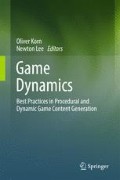Abstract
This chapter portrays the historical and mathematical background of dynamic and procedural content generation (PCG). We portray and compare various PCG methods and analyze which mathematical approach is suited for typical applications in game design. In the next step, a structural overview of games applying PCG as well as types of PCG is presented. As abundant PCG content can be overwhelming, we discuss context-aware adaptation as a way to adapt the challenge to individual players’ requirements. Finally, we take a brief look at the future of PCG.
Access this chapter
Tax calculation will be finalised at checkout
Purchases are for personal use only
References
Balakrishnan, G., Durand, F., & Guttag, J. (2013). Detecting Pulse from Head Motions in Video (pp. 3430–3437). IEEE. 10.1109/CVPR.2013.440
Belinkie, M. (2010, November 11). What Makes Minecraft So Addictive? Retrieved from http://www.overthinkingit.com/2010/11/11/minecraft-vs-second-life/
Boeing, G. (2016). Visual Analysis of Nonlinear Dynamical Systems: Chaos, Fractals, Self-Similarity and the Limits of Prediction. Systems, 4(4), 37. 10.3390/systems4040037
Brach, M., Hauer, K., Rotter, L., Werres, C., Korn, O., Konrad, R., & Göbel, S. (2012). Modern principles of training in exergames for sedentary seniors: requirements and approaches for sport and exercise sciences. International Journal of Computer Science in Sport, 11, 86–99.
Génevaux, J.-D., Galin, É., Guérin, E., Peytavie, A., & Beneš, B. (2013). Terrain Generation Using Procedural Models Based on Hydrology. ACM Trans. Graph., 32(4), 143:1–143:13. 10.1145/2461912.2461996
Hendrikx, M., Meijer, S., Van Der Velden, J., & Iosup, A. (2013). Procedural Content Generation for Games: A Survey. ACM Trans. Multimedia Comput. Commun. Appl., 9(1), 1:1–1:22. 10.1145/2422956.2422957
Hosking, C. (2013, October 12). Stop dwelling on graphics and embrace procedural generation. Retrieved from http://www.polygon.com/2013/12/10/5192058/opinion-stop-dwelling-on-graphics-and-embrace-procedural-generation
Jones, O. (2013, September 1). Polygons to Pixels: The Resurgence of Pixel Games. Retrieved from http://gamingillustrated.com/polygons-to-pixels-the-resurgence-of-pixel-games/
Korn, O., Funk, M., Abele, S., Hörz, T., & Schmidt, A. (2014). Context-aware Assistive Systems at the Workplace: Analyzing the Effects of Projection and Gamification. In PETRA’14 Proceedings of the 7th International Conference on PErvasive Technologies Related to Assistive Environments (p. 38:1–38:8). New York, NY, USA: ACM. 10.1145/2674396.2674406
Korn, O., Funk, M., & Schmidt, A. (2015). Assistive Systems for the Workplace: Towards Context-Aware Assistance. In L. B. Theng (Ed.), Assistive Technologies for Physical and Cognitive Disabilities (pp. 121–133). IGI Global. Retrieved from http://services.igi-global.com/resolvedoi/resolve.aspx?doi=10.4018/978-1-4666-7373-1
Korn, O., Rees, A., & Schulz, U. (2015). Small-Scale Cross Media Productions: A Case Study of a Documentary Game. In Proceedings of the ACM International Conference on Interactive Experiences for TV and Online Video (pp. 149–154). New York, NY, USA: ACM. 10.1145/2745197.2755516
Mandelbrot, B. B. (1982). The fractal geometry of nature. San Francisco: W.H. Freeman.
Olano, M., Hart, J. C., Heidrich, W., Mark, B., & Perlin, K. (2003, March 1). Real-time shading languages. Retrieved from http://www.csee.umbc.edu/~olano/s2002c36/ch02.pdf
Perlin, K. (1985). An Image Synthesizer. In Proceedings of the 12th Annual Conference on Computer Graphics and Interactive Techniques (pp. 287–296). New York, NY, USA: ACM. 10.1145/325334.325247
Perlin, K. (1999, September). Making Noise. Presented at the GDCHardCore.
Persson, M. (2011, March 19). Terrain generation, Part 1. Retrieved from http://notch.tumblr.com/post/3746989361/terrain-generation-part-1
Schell, J. (2015). The Art of Game Design: A Book of Lenses (Second edition). Boca Raton: CRC Press.
Shaker, N., Togelius, J., & Nelson, M. J. (2016). Fractals, noise and agents with applications to landscapes. In Procedural Content Generation in Games (pp. 57–72). Springer International Publishing. 10.1007/978-3-319-42716-4_4
Thue, D., & Bulitko, V. (2012). Procedural game adaptation: Framing experience management as changing an mdp. In Eighth Artificial Intelligence and Interactive Digital Entertainment Conference. Retrieved from http://musicweb.ucsd.edu/~sdubnov/Mu270d/AIIDE12/03/WS12-14-012.pdf
Togelius, J., Kastbjerg, E., Schedl, D., & Yannakakis, G. N. (2011). What is Procedural Content Generation?: Mario on the Borderline. In Proceedings of the 2nd International Workshop on Procedural Content Generation in Games (p. 3:1–3:6). New York, NY, USA: ACM. 10.1145/2000919.2000922
Yannakakis, G. N., & Togelius, J. (2011). Experience-Driven Procedural Content Generation. IEEE Transactions on Affective Computing, 2(3), 147–161. 10.1109/T-AFFC.2011.6
Ziegler, G. M. (2013). Mathematik - Das ist doch keine Kunst. Munich, Germany: Knaus.
Author information
Authors and Affiliations
Corresponding author
Editor information
Editors and Affiliations
Rights and permissions
Copyright information
© 2017 Springer International Publishing AG
About this chapter
Cite this chapter
Blatz, M., Korn, O. (2017). A Very Short History of Dynamic and Procedural Content Generation. In: Korn, O., Lee, N. (eds) Game Dynamics. Springer, Cham. https://doi.org/10.1007/978-3-319-53088-8_1
Download citation
DOI: https://doi.org/10.1007/978-3-319-53088-8_1
Published:
Publisher Name: Springer, Cham
Print ISBN: 978-3-319-53087-1
Online ISBN: 978-3-319-53088-8
eBook Packages: Computer ScienceComputer Science (R0)

